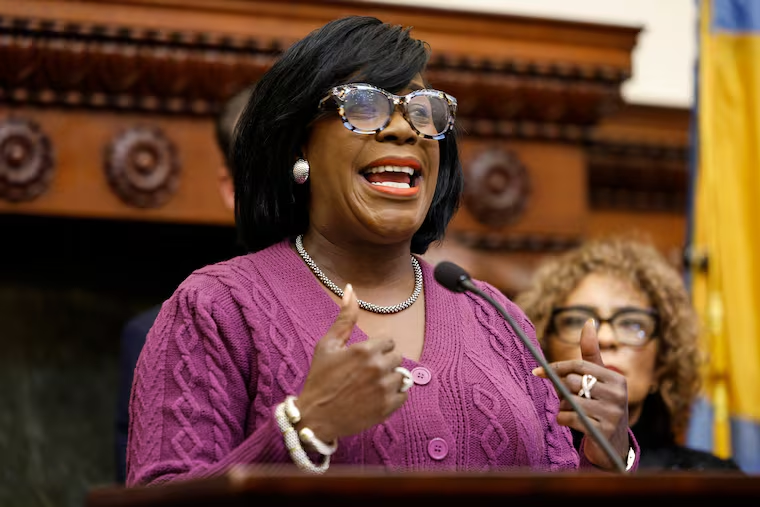Mayor Cherelle Parker’s 100-day report card | Editorial
Addressing crime, schools, and taxes is critical for Philadelphia's success. So far, the mayor's grade is incomplete.

Shortly after being sworn in, Mayor Cherelle L. Parker released a 100-day action plan that focused on public safety, quality-of-life issues, housing, economic opportunity, and education. As Parker’s 100th day in office arrives on Tuesday, a performance assessment is in order.
Public safety
After years of record gun violence and lawlessness, Parker made tackling crime her top priority. So far, the city is off to a strong start. Homicides are down roughly 35%. However, gun violence began dropping before Parker took office and is down nationwide. (Boston had just two murders in the first quarter of this year, compared with 62 in Philadelphia.)
So it is hard to say if Parker’s presence has been the difference. But there is a noticeable change. Just doing the basics matters.
New Police Commissioner Kevin Bethel has yet to release his crime-fighting plan. But the police seem empowered to enforce smaller, quality-of-life regulations and have ramped up enforcement of illegal ATVs. The Philadelphia Parking Authority is ticketing cars parked on sidewalks. Even District Attorney Larry Krasner created a task force to address retail thefts.
There is still work to be done, and safety concerns continue to plague SEPTA. In March, there were three deadly bus shootings in three days. And while data show Center City is safe, not everyone agrees.
It is still early, but Parker’s overall push to restore order is making a welcome impact.
Schools
Parker said funding public education “has to become our number one priority.” Her budget earmarked $140 million in additional money for schools over five years.
She called on others to support public education, including federal and state government and the business and philanthropic communities. How or if that will happen is unclear.
The mayor also hinted at a major plan to modernize school facilities while connecting schools with city services such as health centers and libraries. That could be a game changer, but how to fund it remains to be seen.
One concern: Parker seems supportive of charter schools despite their mixed academic record and questions regarding transparency and conflicts of interest.
Two of Parker’s five picks for the school board have ties to charter schools. What that means bears watching. The goal should be to improve existing schools and hold failing charters accountable before adding new ones.
Taxes
Parker’s biggest early miscue was reversing course on her pledge to continue the incremental cuts in wage and business taxes. With an expected surplus of $535 million, this was a missed opportunity to do something bold to address the city’s onerous tax structure, which has long hampered growth.
Ending the tax cuts sends a bad message to residents and businesses, as well as others looking to locate in Philadelphia — especially as remote work has made many employees more mobile.
Housing
Parker proposed adding 30,000 affordable housing units in her first term. But the details of this ambitious plan remain vague beyond references to investing in existing programs such as Turn the Key, Restore, Repair, Renew, and the Basic Systems Repair Program.
Meanwhile, Parker abruptly canceled plans to build tiny house communities for those experiencing homelessness. The move came as homelessness has increased in Philadelphia over the last two years. So, what is the plan? For now, Parker’s affordable housing initiative remains a work in progress.
Kensington
The city finally has a mayor willing to do something about the open-air drug market and homeless encampments that have long plagued Kensington.
Parker has the right approach to restore safety and cleanliness for the residents of Kensington. But the efforts must balance the need to support those battling addiction, and not just arrest or chase them to other neighborhoods.
Parker is flat wrong to end funding for nonprofits that oversee needle exchange programs. This is a proven strategy that saves lives and prevents the spread of HIV. The minimal cost is worth the public health benefits.
Parker deserves props for taking on a seemingly intractable problem in Kensington. But she would be wise to make sure her tough love approach includes some love.
Sixers arena
This could be the biggest decision of Parker’s term. The outcome will impact the city for decades to come. Whatever gets decided is sure to rankle some residents and powerful business interests.
Whether the arena gets built or not will also impact the future of Market East and a recently proposed development at the stadium district in South Philadelphia. This Editorial Board has argued for trying to find a win-win that benefits the entire city. That should still be the goal.
Leadership
After former Mayor Jim Kenney seemingly quit on the city, it is welcome to have a mayor who wants the job. Parker certainly has a presence, though she is not always accessible.
In fact, her administration clamped down on all media requests so all questions run through her office. The argument is to maintain a consistent message, but it is inefficient and reeks of paranoia.
While it is refreshing to have the city’s first female mayor, most of Parker’s top hires are career bureaucrats from Philadelphia, leaving little room for outside perspective.
Parker did shake up City Hall. She split the Streets Department into two distinct operations, one for streets and the other for sanitation. She also split the Department of Licenses and Inspections. It is hard to say if either reorganization will increase efficiency or add to the bureaucracy.
One red flag is the 151% increase in the budget for the mayor’s office, which ballooned from 39 positions to a whopping 113. At first blush, that seems like a lot of featherbedding.
Successful leaders back their words with actions. Addressing crime, schools, and taxes is the three-legged stool to support a thriving city. So far, Parker is batting 1-for-3, which is better than the Phillies. Fortunately, baseball and politics have long seasons.